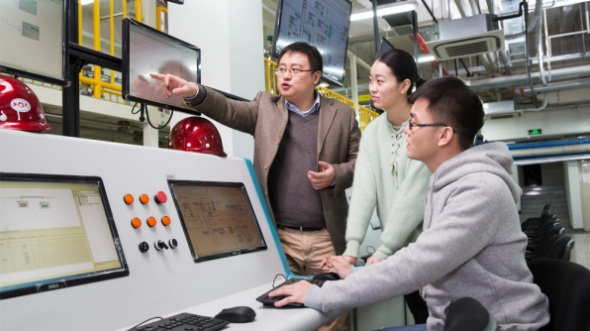
(Photo/Courtesy of Siemens)
As China strides ahead with its "Made in China 2025" road map, labor-force training has become key for enterprises working to digitalize their operations, especially in this new industrial age where efficiency, flexibility and higher standards are the market rule.
"The industry is facing new challenges. It is about going to the market faster; it is about increasing flexibility. Customer demands are getting more and more individualized. There is the dilemma: On one side, you have to deliver production efficiency, and on the other side, to customize products. Last but not least, customers are more and more used to higher standards of quality," said Lothar Herrmann, CEO of Siemens Greater China, in an interview with the People's Daily Online.
Through its newly launched digitalization experience center in Beijing, Siemens has been leading the way for Chinese enterprises ready to join the new era. The center showcases its digital enterprise solutions, including the cloud-based IoT operating system MindSphere and "Digital Twin," as well as Siemens Electronic Works Chengdu (SEWC), which has doubled output while maintaining the product deficiency rate around 10 in of 1 million.
In addition to highlighting advanced technology and innovation, Herrmann underlined the importance of education and training, which helps potential employees better adapt to emerging jobs. Herrmann referred to this focus as the "last but not least" element of Germany's strong leadership in the fourth industrial revolution.
"China is undergoing transformation and still has to go into very old-tradition industries with overcapacity that have to be transformed. It is not an easy situation … the Chinese government understands very well that there is a need to transform existing industries; on the other hand, China also understands that international companies have a potential to play together," Herrmann described, stressing that retraining people is very important for both states and companies.
However, the CEO also observed the imbalance of qualified workers among different regions in China: "A lot of mechanical jobs will be taken over by robotics and intelligent machines. The machines talk to each other. Jobs require operators not to operate, (but)rather to control. This is a completely different skill set which you need to apply."
As early as 2011, Siemens and China's Ministry of Education (MOE) signed a cooperation memorandum in support of China's manufacturing talent-training. Last May, the memorandum was renewed under the "Made in China 2025" initiative to boost innovative talents. Between 2011 and 2015, Siemens's total investment in Chinese education topped 711 million RMB. More than 300 laboratories have been set up in Chinese universities and vocational schools, with 56 varieties of electronic automation and mechanical equipment provided by Siemens.
"We are a business, but we do business for society," explained Herrmann.
Hailing from Germany, where the Industrie 4.0 initiative goes hand in hand with "Made in China 2025," Siemens takes pride in its 145-year-long history in China.
"There is a little bit of difference between (Siemens and) many other companies. We do real R&D in China, for China and with China. We are building partnerships with traditional companies. We are also applying our global knowledge to specific problems. We open our knowledge and develop stuff together; we are not just a supplier to a customer," Herrmann said proudly.
The CEO also pointed out that Chinese enterprises remain at very different levels of automation. For those who are ready to become digital enterprises, the issues of cyber security and data security stand in the way, as an open digital platform requires data access and analysis.
Additionally, Herrmann noted that Siemens supports China's Belt and Road Initiative, and would like to work with Chinese companies to transform potential projects into real businesses. Siemens has a strong presence in over 200 countries and regions around the world, and knowledge of local markets will be invaluable in future cooperation.


















































